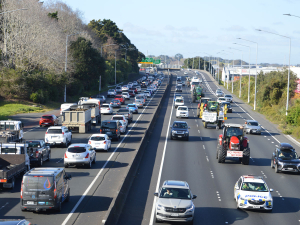94% of NZ farmers oppose Paris Agreement, survey shows
A survey of 2000 farmers shows 94% of respondents believe that remaining in the Paris Agreement for climate change is not in the country's best interest.
 Protestors headed towards the Auckland CBD in one of a series of protests organised by Groundswell NZ.
Protestors headed towards the Auckland CBD in one of a series of protests organised by Groundswell NZ.
In a series of tweets last night, Labour MP and Golden Shears board member Kieran McAnulty said today’s Groundswell NZ protests do not represent the sector.
“The sentiment behind them doesn’t represent the whole sector and undermines the hard work of so many farmers who are keen to get ahead of the curve,” he wrote.
McAnulty, who is MP for Wairarapa and the Labour Party’s chief whip, wrote that the Government recognised that the pace of change was concerning for farmers.
“The Government hears that and has shown a willingness to amend things in order to make it work. We will continue to do so.”
He said he was concerned that someone would do or say something to hurt the image of farmers and how those overseas view New Zealand.
“They will look at our protests and wonder why we are opposing proposals that aren’t as harsh as those they have in their own countries. These are the very same people in the very same markets we want to sell more of our products to.”
“I will continue to back the majority of farmers who want the best price for their products, the best for the environment and the best for our country.”
Coming in at a year-end total at 3088 units, a rise of around 10% over the 2806 total for 2024, the signs are that the New Zealand farm machinery industry is turning the corner after a difficult couple of years.
New Zealand's animal health industry has a new tool addressing a long-standing sustainability issue.
The Government has announced that ACC will be a sponsor of this year's FMG Young Farmer of the Year competition.
As veterinary student numbers grow to help address New Zealand's national workforce shortge, Massey University's School of Veterinary Science is inviting more veterinary practices to partner in training the next generation of vets.
South Island dairy farmers will soon be able to supply organic milk to Fonterra.
Norwood has announced the opening of a new Tasman dealership at Richmond near Nelson next month.